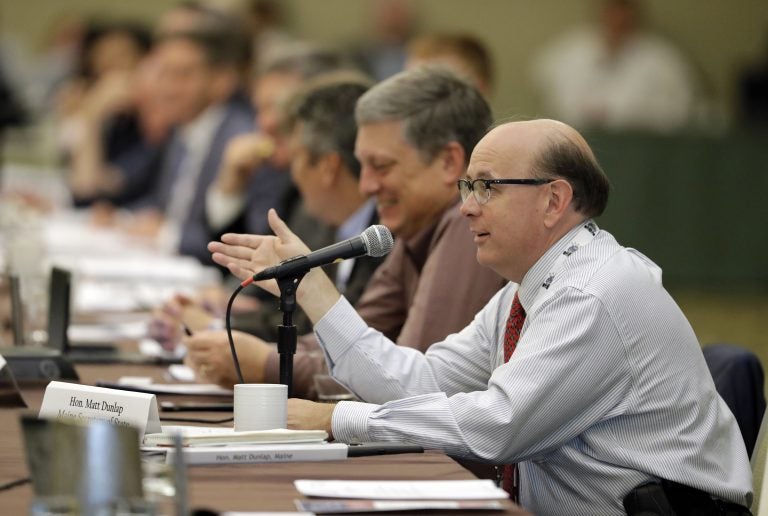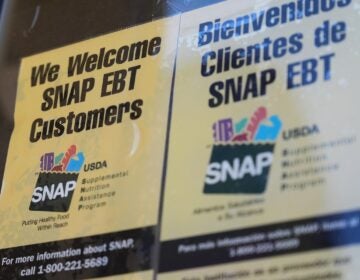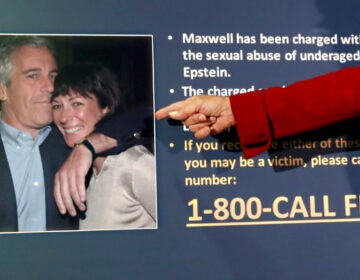Whatever happened to Trump’s fraudulent voter fraud commission?
An old Yiddish quip comes in handy during times of misfortune: "It could always be worse."

FILE - In this July 8, 2017 file photo, Maine Secretary of State Matt Dunlap speaks during a voter registration meeting at the National Association of Secretaries of State conference in Indianapolis. A voter fraud commission established by President Donald Trump could make it easier for hackers to get voter registration information. The panel asked election officials across the country for public information about voters. Most states are complying. Dunlap, a Democrat who is a member of Trump’s voting commission, is not handing over the information. Dunlap said the information the commission is getting from other states “isn’t wicked intimate” and may be too sparse to identity ineligible registered voters. (AP Photo/Darron Cummings, File)
An old Yiddish quip comes in handy during times of misfortune: “It could always be worse.” That’s a good ‘tude to have at the moment, as congressional Republicans prepare to feather the nests of fat cats and screw the average taxpayer. Because things would indeed be worse if Trump’s crackpot voter fraud commission was actually functioning.
We need to remember that along with the GOP’s trickle-down ideological madness and Trump’s knee-jerk authoritarian instincts, there is also a generous dose of Keystone Cops.
Remember last winter, when Trump announced without a shred of factual evidence that as many as five million illegal votes were cast in 2016, thereby stealing his popular vote victory? Remember how he acted on his delusion by creating an Orwellian-titled “Advisory Commission on Election Integrity” to identify those five million illegals and unearth the voter fraud epidemic that reputable national studies have long found to be nonexistent? Remember how it quickly became clear that the commission’s real purpose was to spearhead voter suppression strategies making it harder for non-white non-Republicans to cast ballots?
Well, guess what. This fraudulent voter fraud group, created seven months ago, has met exactly twice. Back in early September, the Republican vice chairman insisted without a shred of factual evidence that thousands of illegal voters had crossed into New Hampshire on ’16 election day to deprive Trump of victory in the Granite State. Heated arguments ensued. That was the last time the group met, and no further meetings have been scheduled.
There have been all sorts of problems. One of the group’s researchers has been arrested on child pornography charges, and nine lawsuits have been filed against the group for a variety of reasons — most notably, to halt the group’s request that states fork over sensitive voter info (names, addresses, party affiliation, partial Social Security numbers) in order to give the Trump White House a centralized data base. Former U.S. intelligence and counter-terrorism officials have already told a federal court that a Trump data base would be “a treasure trove for malicious actors … a foreign adversary acquiring such information and making use of it without detection.”(Translation: It would be a gift for Putin, tied with a bow.)
The group’s flacks complain that the lawsuits have made it tougher for the group to focus on its work and hold meetings. Moreover, it is being sued by one of its own members. Maine Secretary of State Matt Dunlap — one of the four token Democrats on the 11-member panel — contends that Trump’s group, which was formed “to answer monster-under-the-bed questions about ‘voter fraud,’ ” has been “cloaking itself in secrecy, contrary to federal law.”
The law he cites, signed by Richard Nixon in 1972, says that all presidential advisory commissions must be transparent. For starters, they’re required to keep their own members fully informed. Dunlap says in court documents that he has been consistently frozen out — he has no idea when or if meetings are being scheduled; no idea whether commission staffers have been communicating with federal agencies — and that he can’t even get his emails answered. For the record, vice chairman Kris Kobach, the Kansan well known for his vote-suppression efforts, says that Dunlap’s lawsuit is “baseless and paranoid.”
What’s truly paranoid, of course, is the Trump-Kobach belief that non-white illegals are flooding the ballot box; the commission can’t refute the string of national studies that found no epidemic. All the group has is Trump’s delusion, which he articulated in July: “Throughout the campaign and even after it, people would come up to me and express their concerns about voter inconsistencies and irregularities, which they saw.” (When Trump uses a phrase like “people would come up to me,” the BS detector hits tilt.)
The commission’s charter says that meetings must be held “approximately every 30-60 days.” Since its last meeting, the calendar has moved 99 days. Indeed, Kobach has reportedly blamed the lawsuits for the fact “that the panel’s substantive work” has “essentially ground to a halt.” And Kobach says that Dunlap’s lawsuit “is only going to increase the workload.”
See what I mean? Things could always be worse.
—
By the way, on the topic of voting …
The next time someone says, “Nah, I never vote because my vote doesn’t matter,” just cite these stats:
In Virginia yesterday, Democrats deadlocked the state house chamber at 50-50 thanks to a recount in an unresolved district race. Read the final tally.
Democrat Shelly Simonds: 11,608
Republican David Yancey: 11,607
One vote.
One vote changed the balance of power in Virginia.
I’ll just leave it at that.
WHYY is your source for fact-based, in-depth journalism and information. As a nonprofit organization, we rely on financial support from readers like you. Please give today.




